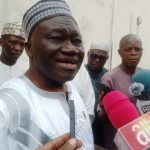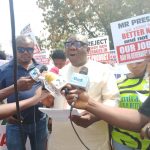Why Nations Prosper and Nigeria Staggers: Rethinking Institutions, Power and Political Will
By Dr. Aiyeku Olufemi Samuel
Co-Founder & Lead Consultant, Global Human Capital & Energy Management
Why do some nations become rich while others remain locked in poverty? Why does Nigeria, blessed with abundant natural resources, a vibrant youthful population, and immense cultural diversity, still struggle to meet basic developmental goals while other less-endowed nations have taken giant leaps forward?
Is it because of geography, history, or perhaps even culture? The real answer lies in institutions and politics.
Nigeria is not poor because it lacks potential. Nigeria is poor because it lacks the right institutional frameworks that prioritize innovation, empower people, and limit the capacity of elites to extract value for personal gain. The wealth of a nation is not in its land or minerals, but in its capacity to build, sustain, and reform institutions that foster growth and equality.
Let us take a historical walk.
* The Industrial Revolution in England happened not merely due to scientific innovation but because society permitted “creative destruction”. New ways of doing things displaced the old, and the rule of law allowed it.
* In contrast, societies that held on tightly to traditional power structures and resisted innovation fell behind.
* South Korea and North Korea began from the same cultural and geographical origins. Yet today, South Korea is a top-15 global economy. Why? Inclusive political and economic institutions.
So, why does Nigeria still remain poor within the African continent?
Because some countries developed more inclusive political institutions, which laid the groundwork for inclusive economic ones. Nigeria has remained trapped in a cycle of elite dominance, extractive institutions, and a lack of accountability.
* Political leaders in Nigeria often act in ways that undermine democratic progress, using state power not to serve but to secure their own wealth and legacy.
* Institutions are often weak, easily manipulated, and devoid of public trust.
* Debts mount without a matching rise in productivity or public infrastructure.
According to the Debt Management Office (DMO), Nigeria’s total public debt stood at over N97.34 trillion as of Q1 2025. Yet basic amenities like stable electricity, accessible healthcare, and quality education remain elusive.
Can we then say that politics in Nigeria is failing the nation? Perhaps it is not just failing, but misaligned with the demands of development.
* Powerful elites rig the rules of economic and political engagement to benefit themselves.
* Sensible economic policies—when they do exist—achieve little because there’s no political will or institutional support to implement them.
* Economic and political forces evolve together. When one is constrained, the other suffers.
Why do sensible economic ideas die on the table in Nigeria?
Because fundamental political change has not occurred. When policymaking is dominated by short-term interests and vested power blocs, visionary economic planning becomes impossible.
Rhetorical question: Can we expect genuine transformation without inclusive governance?
Answer: Never. Political institutions must be restructured to allow participation, competition, accountability, and transparency.
Countries develop when:
* They create political systems that allow power to be contested and shared.
* They nurture political parties that serve the people and not the politicians.
* They build economies that reward effort, merit, and innovation.
Nigeria can rise, but it must make deliberate choices:
* Limit extraction by curbing corruption and elite capture.
* Promote creative destruction by supporting new ideas, young entrepreneurs, and digital infrastructure.
* Build strong political institutions that share power and protect rights.
A vibrant democracy isn’t just about elections. It’s about institutions that check power, media that informs, and citizens that engage.
Let’s not forget:
“Institutions are not just rules; they are the foundations of progress. Weak institutions weaken everything.”
Quote: “A nation is only as strong as the institutions that uphold its values and aspirations.”
Wake-up call to Nigerian leaders:
* Get serious about reform.
* Face the debt crisis with transparency and responsibility.
* Build institutions that outlast your tenure.
If Nigeria is to escape the trap of poverty, we must break the cycle of extraction and replace it with a culture of inclusion, innovation, and integrity.
What we need is not more promises, but more power to the people.
The nations that have succeeded, from Singapore to Estonia, all have one thing in common: they built institutions that outlived politics and created systems that respected the voice and value of every citizen.
The future Nigeria deserves is still possible—but only if we embrace the hard path of institutional rebirth and political courage.
Let us rise.
Let us reform.
Let us rebuild.
GOD BLESS NIGERIA 🇳🇬
Dr. Aiyeku Olufemi Samuel
Co-Founder & Lead Consultant, Global Human Capital & Energy Management
Governance Analyst|
Development Economist|
Policy Consultant| Strategic Development Advocate| Climate Action Enthusiast | Sustainability & Impact Investing Specialist|Girl-child Advocacy| PPP & CRM Specialist /Sales Innovation & Transformational Results-Driven Business Analyst












